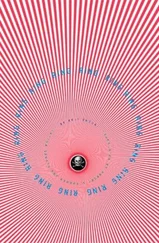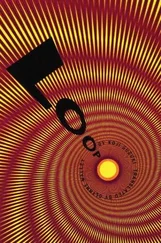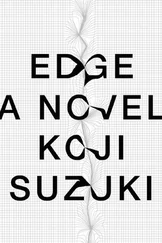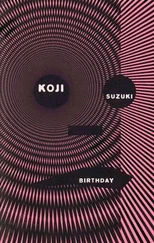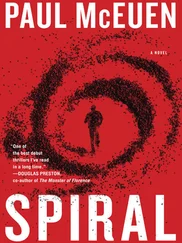Kojo Suzuki - Spiral
Здесь есть возможность читать онлайн «Kojo Suzuki - Spiral» — ознакомительный отрывок электронной книги совершенно бесплатно, а после прочтения отрывка купить полную версию. В некоторых случаях можно слушать аудио, скачать через торрент в формате fb2 и присутствует краткое содержание. Год выпуска: 2007, ISBN: 2007, Издательство: Harper, Жанр: Ужасы и Мистика, на английском языке. Описание произведения, (предисловие) а так же отзывы посетителей доступны на портале библиотеки ЛибКат.
- Название:Spiral
- Автор:
- Издательство:Harper
- Жанр:
- Год:2007
- ISBN:9780007240142
- Рейтинг книги:4 / 5. Голосов: 1
-
Избранное:Добавить в избранное
- Отзывы:
-
Ваша оценка:
- 80
- 1
- 2
- 3
- 4
- 5
Spiral: краткое содержание, описание и аннотация
Предлагаем к чтению аннотацию, описание, краткое содержание или предисловие (зависит от того, что написал сам автор книги «Spiral»). Если вы не нашли необходимую информацию о книге — напишите в комментариях, мы постараемся отыскать её.
Spiral — читать онлайн ознакомительный отрывок
Ниже представлен текст книги, разбитый по страницам. Система сохранения места последней прочитанной страницы, позволяет с удобством читать онлайн бесплатно книгу «Spiral», без необходимости каждый раз заново искать на чём Вы остановились. Поставьте закладку, и сможете в любой момент перейти на страницу, на которой закончили чтение.
Интервал:
Закладка:
He picked up an English book he happened to spy nearby and started examining a page at random to see just how often the same letter occurred three times in succession. He’d gone through four or five pages before he found a single instance. The chances of it happening three times in one fourteen-letter sequence were basically nil, he concluded. By contrast, dividing up the forty-two letters into pairs produced just one double letter. As a result, he decided that statistically it made more sense to go with the first option and divide the bases into pairs of letters.
He’d narrowed down the possibilities. From here he could proceed through trial and error.

The AA pair appeared four times, which meant it must correspond to a letter used with great frequency. Consulting another chart, Ando confirmed that the most frequently used letter in English is, of course, E. So he hypothesized that AA stood for the letter E. The second most common pairs in his sequence were TA and TC, occurring three times each. He also noticed that AA was followed by TA once, while TC was followed by AA once. This might be important, since there were also statistics for various combinations of letters. He started trying out various possibilities for TA and TC, constantly referring to his charts.
As far as letters which often follow the letter E and which are also common in and of themselves, the letter A seemed like the best candidate, which meant that TA could stand for A. By the same logic, he thought that TC might correspond to the letter T. Further, by the way it combined with other letters, he guessed that CC might be N. Thus far the statistics seemed to be serving him well. At least, he hadn’t run into any problems.
This is what he had:
_ _E_ _EAT_AA_NT_ NTE_ _E
What had once seemed a random jumble of letters now seemed to be taking on the aura of English. Next he tried filling in the blanks based on what he knew of consonant-vowel combinations, always consulting the charts.
SHERDEATYAALNTINTECME
The first three letters seemed to form the word “she”, but the rest of it didn’t form words no matter how he divided it up. He tried switching the positions of the E’s, A’s, T’s, and N’s, and changed other letters around on hunches. When it became too time-consuming to write down the possibilities on paper, he tore sheets out of his notebook, first to make twenty-six cards, one for each letter. It was beginning to feel like a game.
THEYWERBORRLNBINBECME
When he hit on this combination, the first thing that popped into Ando’s mind was the phrase “they were born”. He knew the spelling was a bit off, but maybe it wasn’t too much of a stretch. And the meaning struck a chord with him somehow. But he had a feeling there was a better match out there somewhere, so he kept at the game.
After about ten minutes of playing around, Ando thought he could guess what the result would be, and he stopped. If he had a computer with him, things would be much easier, he thought. The third, sixth, eighteenth, and twenty-first letters were the same. The seventh, tenth, and eleventh were the same. The eighth, fourteenth, and seventeenth were the same. The thirteenth and the sixteenth were the same. The phrase was twenty-one letters long. If he fed those conditions into a computer it would probably come up with the answer, provided he made the proper adjustments for frequency of letter usage. But the computer would undoubtedly come up with several possible solutions. There had to be an infinite number of meaningful phrases in English that satisfied those conditions. How would he be able to tell which one was Ryuji’s message to him? Only if there was something about the right answer that would tell him at first glance that it was from Ryuji, like a signature at the end of a letter. But if there wasn’t, he’d be lost.
Ando realized he was at a dead end. He hung his head, feeling stupid that it had taken him this long to notice. Back in his student days, when his code-breaking intuition had been more finely honed, he would have caught on to this impasse in a minute or two. He’d have to change the way he thought about this. He needed a new hypothesis.
Ando was so absorbed he hadn’t noticed the passage of time. He looked at his watch now to find it was nearly one in the afternoon. He realized he was hungry. He stood up, thinking to go have lunch in the cafeteria on the fourth floor. A change of surroundings would do him good. Trial-and-error and inspiration: he was going to need both if he was going to come up with a solution. And he often got his inspirations while he ate.
The answer to this is going to have to be obvious.
He whispered it almost like an incantation as he headed for the fourth floor.
4
As he ate the set lunch, Ando gazed out the window at the trees down below, and at the kids playing on the swings and the seesaws in the park. It was past one now. The cafeteria had been packed when he arrived, but now there were empty seats here and there. The printout with the base sequence sat on the table next to his aluminum tray, but he wasn’t looking at it.
One wall of the cafeteria had floor-to-ceiling windows, so there was nothing to obstruct his view of the children playing. It was like watching a silent movie. Whenever he saw a boy of about five, Ando’s gaze was riveted to him. Without even realizing it, he’d stare at the child, and it would take him several minutes to snap out of it.
He’d come to this library with his son once. It was a Sunday afternoon two years before, when they were living in the South Aoyama condo. Ando had suddenly realized he needed to look up some data for a presentation he was scheduled to give at a research conference, so he decided to come to the library. He took Takanori along for the walk. But when they got there, a sign at the entrance said NO ONE UNDER 18 ADMITTED. He couldn’t very well make the boy wait outside while he did his research, so he gave up and they played in the park instead. He could remember standing behind the swings, pushing Takanori; he could remember the rhythm of the swing. That same swing was in motion now, under the golden gingko leaves. He couldn’t hear a sound, couldn’t even see the expressions on the faces of the children as they alternately stretched out their legs and tucked them in. But in his mind’s ear he could hear his son’s voice.
But he was getting off track. He brought his gaze back to the page and picked up his pen.
It was time to get back to the basics of code-breaking. There was no other way to crack this kind of code but to come up with several hypotheses, and then pursue each one of them in turn. When it became clear that one theory wasn’t working out, the best thing to do was abandon it with alacrity and move on to the next one. For a message of only twenty-one letters, he wouldn’t be able to rely solely on frequency charts and letter-combination rules. In fact, if the code was complicated enough to require a specific conversion key, it ran the risk of being too hard, in which case it wouldn’t be able to convey what it wanted to. No, he needed to simply work through a bunch of theories by trial and error. If an idea wasn’t working, he needed to abandon it, that was all.
There was one hypothesis that Ando thought he had abandoned too soon, though. It occurred to him that the code might be an anagram.
He returned to the reading room and once again split the forty-two letters into groups of three.
ATG GAA GAA GAA TAT CGT TAT ATT CCT CCT CCT CAA CAA CAA
He’d abandoned this approach because it resulted in triple repetitions of the same letter, a very unusual thing in English. But what if the letters themselves needed to be rearranged? He thought of an example he’d read once, where the phrase “Bob opened the door” had been encoded as OOOOEEEBBDDTPNHR. As it was, the sequence contained far too many letter repetitions to make sense as English, but when rearranged according to a certain set of rules, it yielded a perfectly normal sentence.
Читать дальшеИнтервал:
Закладка:
Похожие книги на «Spiral»
Представляем Вашему вниманию похожие книги на «Spiral» списком для выбора. Мы отобрали схожую по названию и смыслу литературу в надежде предоставить читателям больше вариантов отыскать новые, интересные, ещё непрочитанные произведения.
Обсуждение, отзывы о книге «Spiral» и просто собственные мнения читателей. Оставьте ваши комментарии, напишите, что Вы думаете о произведении, его смысле или главных героях. Укажите что конкретно понравилось, а что нет, и почему Вы так считаете.

